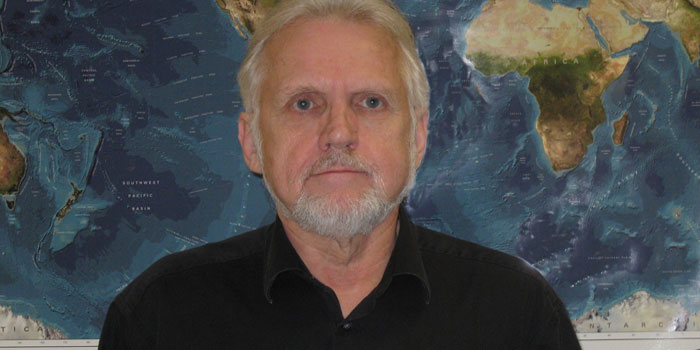You can hear more from Dr. Embley and his journey to become a geophysicist here.

About the Job
What is your title?
Geophysicist GS-15.
Where do you work?
I work at the NOAA Pacific Marine Environmental Laboratory. Our group is located at the Hatfield Marine Science Center in Newport, Oregon.
Do you travel often?
During my career, which began in the 1960s, I have traveled to many places to and from research vessels. These include Iceland, Africa, Europe, Australia, New Zealand, Asia and South America. Most of the “travel time” away from home, however, is on the research vessels, which spend the majority of time in the open ocean out of the sight of land. I sometimes also attend international meetings, workshops and field trips.
What are the educational requirements for your job?
To be a research oceanographer, one usually has to earn a Doctorate. Technical jobs are also open to those with Master’s and Bachelor’s degrees in science and engineering.
What is the salary range for someone with your type of job?
For a senior research scientist with a Ph.D., the salaries range between about 80 and 130 thousand per year.
How many hours do you work per week?
This varies—when at sea, 18 hour days are not unusual. Onshore, I work more than 50+ hours during the week and often put in time on weekends.
Job Duties
Tell us about your research and the types of things you do.
I work with seafloor maps and images using various software programs to analyze the processes that create undersea features such as submarine volcanoes.
What is the most fascinating thing you have ever seen or done?
One eureka moment was in graduate school when, in looking through some subseafloor sounding records, came on some extraordinary examples of structures which led to some of the first documentation of giant submarine landslides and submarine debris flows. More recently, we have had several extraordinary expeditions over the past 15 years where new phenomena have been seen for the first time. For example, in 1993 we conducted the first fast response to an underwater eruption that was remotely detected by undersea hydrophones and saw lava flows only a week or so in age covered with microbial mats. In 2004, we discovered several extraordinary sites along the Marina Arc in the western Pacific. These included a hydrothermal vent emitting droplets of liquid carbon dioxide, and an erupting volcanic vent at 1,800′ depth emitting caustic fluids that corroded the submersible.
What are the personal rewards of your work?
When we go to sea in a new area that’s never been surveyed before or never visited with a submersible, we are seeing parts of the ocean floor for the first time by any human, I feel very privileged. In recent years, I have also have taken on increasing responsibility for organizing and leading expeditions. These expeditions involve complex logistics and are composed of large, diverse groups of biologists, geologists, chemists and physical oceanographers from several countries. There is great satisfaction in working with these very talented and motivated scientists. It is always a rich learning experience, especially when we find some new phenomenon never seen before. Sharing discoveries with students and the public is also very rewarding.
How does your work benefit the public?
We conduct basic research on the chemistry, geology, biology and physics of submarine volcanoes. Our species is profoundly affecting the ocean’s ecosystems but we still only have a limited understanding of what is out there. The extreme environments associated with submarine volcanoes contain very interesting microbial life which is able to cope with great pressure, high temperatures and very unusual chemical conditions. How life copes with these conditions is a new area of biology that holds great promise for producing discoveries important to industry and medical science. The microbes produce specialized enzymes that are of interest to biotechnology and could lead to new products and drugs.
What else could someone with your background do?
Ph.D. research scientists have specialized skills. Before pursuing a Ph.D., one should have a passion for research and/or teaching at a college level. The petroleum industry and offshore commercial survey companies also hire some marine geologists and geophysicists.

